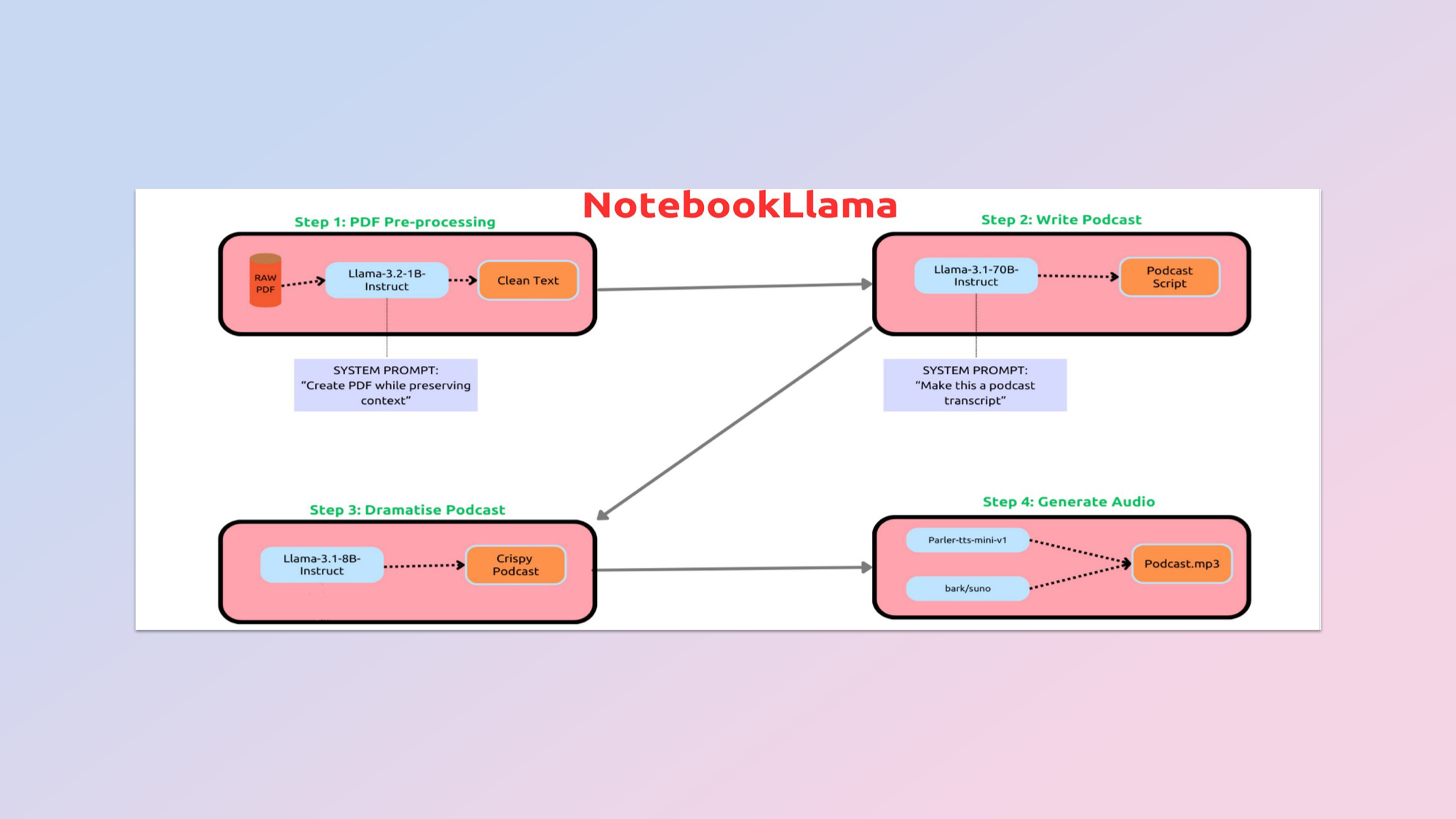Meta takes on Google’s NotebookLM with new NotebookLlama— and its totally free
It is surprisingly good

Here at Tom’s Guide our expert editors are committed to bringing you the best news, reviews and guides to help you stay informed and ahead of the curve!
You are now subscribed
Your newsletter sign-up was successful
Want to add more newsletters?

Daily (Mon-Sun)
Tom's Guide Daily
Sign up to get the latest updates on all of your favorite content! From cutting-edge tech news and the hottest streaming buzz to unbeatable deals on the best products and in-depth reviews, we’ve got you covered.

Weekly on Thursday
Tom's AI Guide
Be AI savvy with your weekly newsletter summing up all the biggest AI news you need to know. Plus, analysis from our AI editor and tips on how to use the latest AI tools!

Weekly on Friday
Tom's iGuide
Unlock the vast world of Apple news straight to your inbox. With coverage on everything from exciting product launches to essential software updates, this is your go-to source for the latest updates on all the best Apple content.

Weekly on Monday
Tom's Streaming Guide
Our weekly newsletter is expertly crafted to immerse you in the world of streaming. Stay updated on the latest releases and our top recommendations across your favorite streaming platforms.
Join the club
Get full access to premium articles, exclusive features and a growing list of member rewards.
Well that didn’t take long. Mere months after Google Labs launched its now viral NotebookLM product, king of the open source world Meta has announced a free customizable AI podcast maker.
NotebookLlama features the same kind of functionality as the Google version, although it’s rougher around the edges and definitely not as pretty.
The key principle of this type of product, and what makes them so popular, is the ability to take raw input like a PDF, doc file, or web URL and convert that to an engaging podcast episode featuring two audio hosts chatting about the subject matter.
It’s super clever, incredibly good at distilling complex topics and a fun way to do learning or research. NotebookLlama, while not as polished as Google's offering, has the benefit of being open source and more adaptable, making it a viable alternative.
What is NotebookLlama from Meta?
The new NotebookLlama from Meta is nowhere near as polished in terms of features or results, but it’s designed as a DIY manual, aka recipe, for anyone with the smarts who wants to create their own NotebookLM-style AI podcast product. And that’s a big deal.
The whole package is of course built around Meta’s Llama family of language models, which can be accessed from various sources across the Web.
What’s interesting is the architecture doesn’t rely only on huge memory-hogging models, but has also been designed to work with the smallest models in the Llama range. That means it should also be usable on modest-sized computer equipment. Another big deal.
Get instant access to breaking news, the hottest reviews, great deals and helpful tips.
The initial audio demo is very impressive, especially considering the product is only a few hours old. The ‘recipe’ uses off-the-shelf technology to power the voices, and it’s surprisingly good at conveying the same kind of emotive vocal nuance that makes the Google product so compelling.
There are even some expressive ums and ahs in there, which helps to balance out the slightly dodgy audio quality, where the volume sinks or word spacing stutters.
How do you access NotebookLlama?

The product page on Github links to some additional resources for people to try out better voice tech options. Hopefully, this means we’ll see an improvement in the quality and range of vocals in the near future, once the open-source community gets to work.
The development team is also asking for dev help to add more media sources for the podcast engine to process. At the moment it’s only PDF files, but the team seems to be hopeful of eventually adding web links, audio and even YouTube links to match Google’s original.
It’s shocking not just how fast this new product has been released, but how good it is for a first iteration. The Meta offering is not the first clone to hit the market, Gabriel Chua released Open NotebookLM on a Hugging Face Space a few weeks back, again based on a Llama model.
But that is nowhere near as slick as this new version, which means NotebookLlama is sure to grab the imagination and support of developers everywhere as the potential starts to sink in.
Get ready for a flood of AI podcast makers to hit the scene soon.
More from Tom's Guide
- Android 16 could launch sooner than expected — here’s what we know
- Google Pixel 9a renders just leaked — no more camera bar
- Samsung Galaxy S25 Ultra dummy units reveal design change — what you need to know

Nigel Powell is an author, columnist, and consultant with over 30 years of experience in the technology industry. He produced the weekly Don't Panic technology column in the Sunday Times newspaper for 16 years and is the author of the Sunday Times book of Computer Answers, published by Harper Collins. He has been a technology pundit on Sky Television's Global Village program and a regular contributor to BBC Radio Five's Men's Hour.
He has an Honours degree in law (LLB) and a Master's Degree in Business Administration (MBA), and his work has made him an expert in all things software, AI, security, privacy, mobile, and other tech innovations. Nigel currently lives in West London and enjoys spending time meditating and listening to music.
 Club Benefits
Club Benefits




















